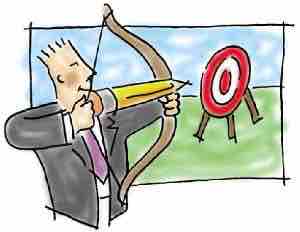Some speeches contain such a wide range of information that the audience is left wondering what the speaker was trying to communicate. A speech with a scope that is too broad complicates the audience's ability to retain information. Properly scoping your speech allows the speaker to narrow down what the speech will cover, thus increasing its ability to inform the audience.

Scope Out a Specific Target
Every piece of information in a speech should be relevant to the topic, purpose and thesis. If it's only a tangent, it doesn't belong in the speech.
Scope refers to the extent of the area or subject matter that something deals with or to which it is relevant. The key word here is relevance; the speech should not go in so many different directions that none of those directions relate to the original purpose and thesis of the speech.
One way to effectively scope a speech is to think of the question: "What information do I want my audience to know at the end of the speech? " Use the answer to this question as a focal point for everything else to be included in your speech. Everything included then must be relevant to your purpose and thesis. Anything superfluous or extraneous is only going to broaden the scope and take the speech away from that ultimate goal.
The evidence and supporting arguments should not only be related tangentially; there should be direct lines of relevance to every piece of information included in your speech.
Scoping a speech is not only helpful for the audience, but is also to the benefit of the speaker. Keeping the speech on point and focused makes it easier for the speaker to build more credible, reinforced arguments. By narrowing the scope of the speech, the speaker improve the speech's ability to effectively communicate essential information to the audience.